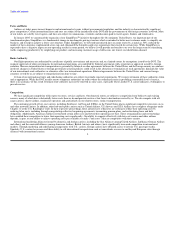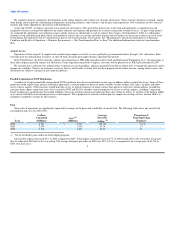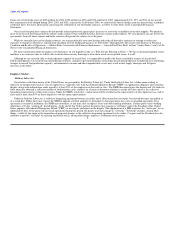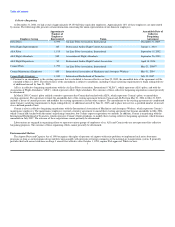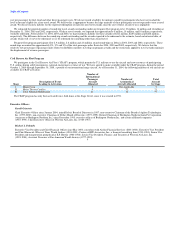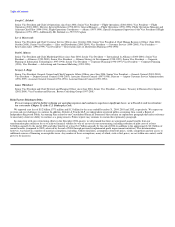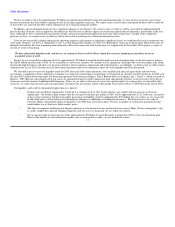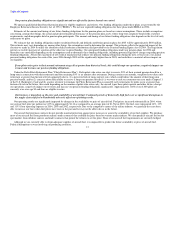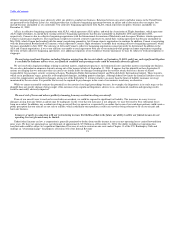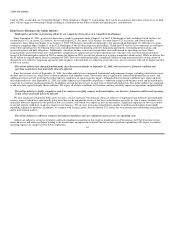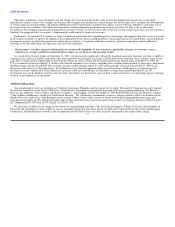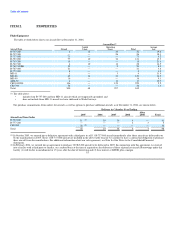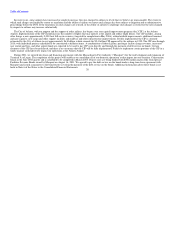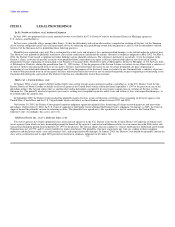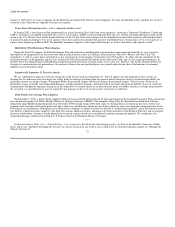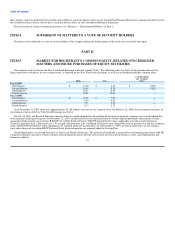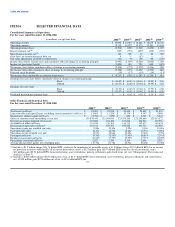Delta Airlines 2004 Annual Report Download - page 18
Download and view the complete annual report
Please find page 18 of the 2004 Delta Airlines annual report below. You can navigate through the pages in the report by either clicking on the pages listed below, or by using the keyword search tool below to find specific information within the annual report.
Table of Contents
changes in government policy concerning aircraft fuel production, transportation or marketing, changes in aircraft fuel production capacity, environmental
concerns and other unpredictable events may result in fuel supply shortages and additional fuel price increases in the future.
Our credit ratings have been substantially lowered and, unless we achieve significant reductions in our cost structure, we will be unable to access the
capital markets for new borrowings on acceptable terms, which could hinder our ability to operate our business.
Our business is highly dependent on our ability to access the capital markets. Since September 11, 2001, our senior unsecured long-term debt ratings have
been lowered to Ca by Moody's Investors Service, Inc., CC by Standard & Poor's Rating Services and C by Fitch Ratings. Moody's and Fitch have stated that
their ratings outlook for our senior unsecured debt is negative while we are on positive watch with Standard & Poor's. Our credit ratings may be lowered
further or withdrawn. We do not have debt obligations that accelerate as a result of a credit ratings downgrade. We believe that our access to the capital
markets for new borrowings is limited, at least in the near term.
Interruptions or disruptions in service at one of our hub airports could have a material adverse impact on our operations.
Our business is heavily dependent on our operations at the Atlanta Airport and at our other hub airports in Cincinnati and Salt Lake City. Each of these
hub operations includes flights that gather and distribute traffic from markets in the geographic region surrounding the hub to other major cities and to other
Delta hubs. A significant interruption or disruption in service at the Atlanta Airport or at one of our other hubs could have a serious impact on our business,
financial condition and operating results.
We are increasingly dependent on technology in our operations, and if our technology fails or we are unable to continue to invest in new technology,
our business may be adversely affected.
We are increasingly dependent on technology initiatives to reduce costs and to enhance customer service in order to compete in the current business
environment. For example, we have made significant investments in check-in kiosks, Delta Direct phone banks and related initiatives across the system. The
performance and reliability of our technology are critical to our ability to attract and retain customers and our ability to compete effectively. In this
challenging business environment, we may not be able to continue to make sufficient capital investments in our technology infrastructure to deliver these
expected benefits.
In addition, any internal technology error or failure, or large scale external interruption in technology infrastructure we depend on, such as power,
telecommunications or the internet, may disrupt our technology network. Any individual, sustained or repeated failure of our technology could impact our
customer service and result in increased costs. Like all companies, our technology systems may be vulnerable to a variety of sources of interruption due to
events beyond our control, including natural disasters, terrorist attacks, telecommunications failures, computer viruses, hackers and other security issues.
While we have in place, and continue to invest in, technology security initiatives and disaster recovery plans, these measures may not be adequate or
implemented properly to prevent a business disruption and its adverse financial consequences to our business.
If we experience further losses of our senior management and other key employees, our operating results could be adversely affected, and we may not
be able to attract and retain additional qualified management personnel.
We are dependent on the experience and industry knowledge of our officers and other key employees to execute our business plans. Our deteriorating
financial performance creates uncertainty that has led and may continue to lead to departures of our officers and key employees. If we were to continue to
experience a substantial turnover in our leadership, our performance could be materially adversely impacted. Additionally, we may be unable to attract and
retain additional qualified executives as needed in the future.
Employee strikes and other labor-related disruptions may adversely affect our operations.
Our business is labor intensive, requiring large numbers of pilots, flight attendants, mechanics and other personnel. Approximately 18% of our workforce
is unionized. Strikes or labor disputes with our and our 14


